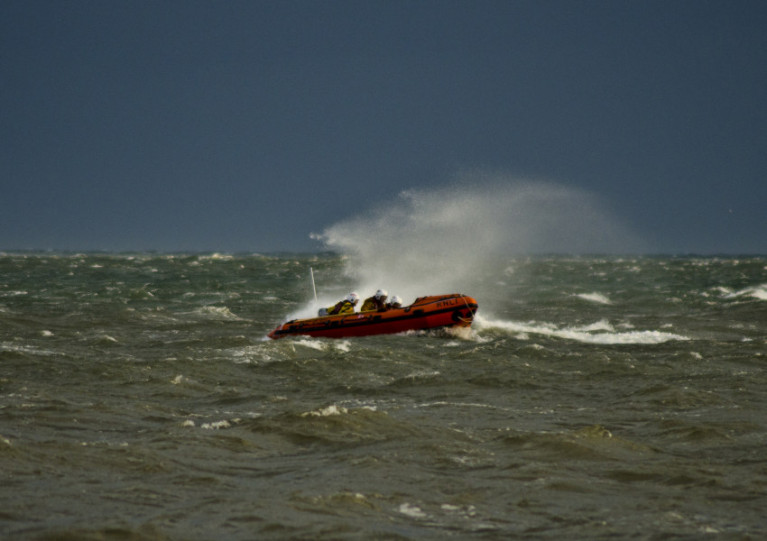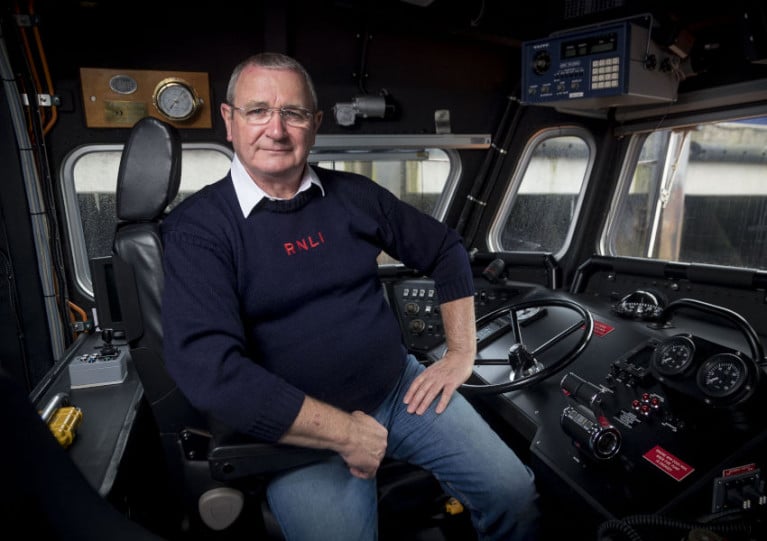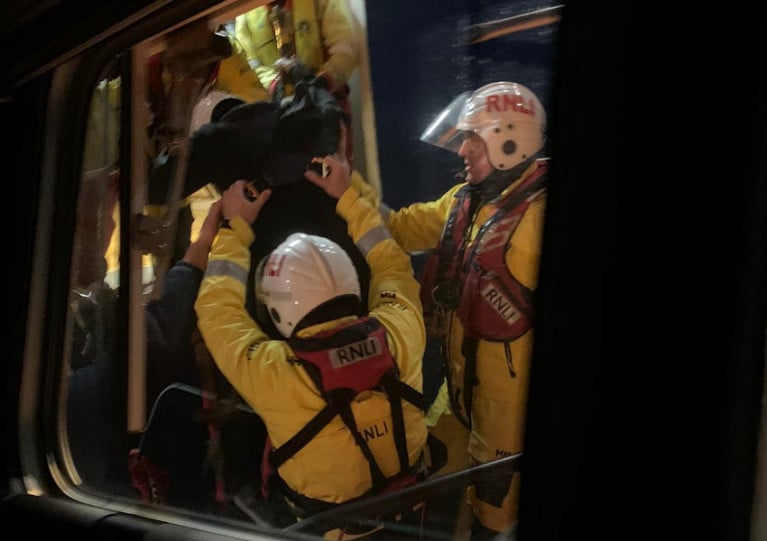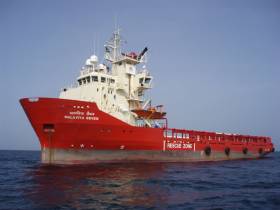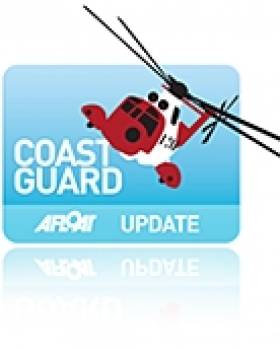Displaying items by tag: Aberdeen
Aberdeen the Granite City Chosen As Venue for Tall Ships 2025
The North Sea port of Aberdeen, Scotland is to host the Tall Ships event again, it has been announced.
Aberdeen writes BBC News have been chosen for the venue in 2025 having hosted the prestigious event twice, firstly in 1991 and then in 1997.
The event is a partnership of Aberdeen City Council, the Port of Aberdeen and Aberdeen Inspired which has received support from organisations across the North East.
Four ports have been announced for the event which runs from June-August, with Aberdeen included alongside two ports in France, Le Havre and Dunkirk and in Norway the southern port of Kristiansand.
An audience of half a million people are according to Aberdeen City Council expected to see the tallships totalling between 30 and 50 vessels.
The fleet will arrive in Aberdeen and remain in port for the four days. Among the events and festivals held in the port city will be a temporary nautical themed village, a crew parade down Union Street, parties, a light show and departure celebrations.
Lord Provost David Cameron said: "This is absolutely terrific news for the city of Aberdeen. Everyone will join me in looking forward to 2025 and welcoming the Tall Ships back to inspire a whole new generation of Aberdonians."
Surfers Caught By Current Rescued Off Aberdeen Harbour
Aberdeen’s two RNLI lifeboats launched minutes apart around 9am this morning (Sunday 27 September) to a report of two surfers in danger at the entrance to Aberdeen Harbour in Eastern Scotland.
It emerged that the surfers had paddled out beyond the surf line and were being swept further and further offshore — the tide and wind preventing them from making their way back.
First on scene was the inshore lifeboat Buoy Woody with her crew of three, having been guided to the precise location — around half a mile offshore at the Footdee end of Aberdeen Beach — by coastguard volunteers ashore.
The two experienced surfers were uninjured but said they were both exhausted, having been in the water for almost two hours. They and their equipment were taken aboard the lifeboat to be returned to shore.
However, with the tide approaching high water, violent surf running up the beach, and the lifeboat RIB loaded to capacity, it was decided to transfer the surfers to the all-weather lifeboat Bon Accord which had arrived in the calmer water beyond the surf line.
Cal Reed, Aberdeen lifeboat’s coxswain on this service, says: “The member of the public who made the initial phone call did the right thing: if you think you see someone in difficulty at sea, always call 999 and ask for the coastguard.”
Elsewhere, on Friday afternoon (25 September) Belfast Coastguard in Northern Ireland requested Troon RNLI’s all-weather lifeboat to assist Arran RNLI with a vessel it had taken under tow to Ardrossan in Western Scotland with its Atlantic 85 inshore vessel.
Aberdeen RNLI has urged surfers to stay ashore during the Covid-19 pandemic to “protect emergency services and save lives”.
The call came after the volunteer crew of the station in north-east Scotland were forced to break self-isolation and launch their inshore lifeboat yesterday (Tuesday 14 April) following reports of a surfer in difficulty at a local beach.
The crew of three mustered quickly and launched the D-class lifeboat Buoy Woody 85N shortly after 3.30pm and reached the scene around 15 minutes later.
The surfer had been reportedly having difficulty getting back on his board and swimming ashore.
However, by the time the lifeboat arrived, the surfer was on his board and in no immediate danger. After speaking with the lifeboat crew, the surfer made his own way ashore.
Bill Deans MBE, operations manager at Aberdeen lifeboat station, said he was disappointed his crew had to expose themselves to risk in this way.
“Like most people, our volunteer lifeboat crew members are self-isolating at home in line with [UK] Government guidelines – mostly doing their day jobs remotely.
“But they are always willing to set aside their own concerns to respond if the call comes that someone is in danger at sea.
“There is no way a lifeboat crew of three can maintain two-metre separation aboard a five-metre long lifeboat – and if they had required to pull someone from the water, the infection concerns are obvious to all.”
Deans added: “I have every sympathy with people who would like to use their daily exercise period to swim, sail, surf or whatever — but on behalf of every lifeboat crew member in the UK and Ireland, I have to appeal to them not to put our crews at indirect risk by going into or onto the sea.
“Stay safe ashore, protect the emergency services and save lives.”
Busy Start To New Year For Aberdeen & Oban Lifeboats
It’s been a busy start to the New Year with multiple callouts for Scottish RNLI lifeboat crews at Aberdeen on the east coast and Oban in the west.
Aberdeen’s all-weather lifeboat was called for a medevac from an oilfield platform supply vessel (PSV) at anchor in Aberdeen Bay on Friday evening (3 January).
The casualty complained of chest pain and numbness in one side of his body – symptoms typically associated with heart attack — and the lifeboat launched immediately, navigating through an unusually busy bay anchorage.
Coxswain Michael Cowlam said: “Conditions were excellent — perfect visibility and a gentle swell from the gentle offshore breeze. The challenge was finding the right vessel in the densely crowded anchorage. None of us had ever seen it so busy.”
Once the casualty’s vessel had been located, however, he was swiftly returned to shore and the care of the Scottish Ambulance Service.
Less than 24 hours previously, Aberdeen’s D-class inshore lifeboat and the all-weather vessel’s Y-boat were launched to assist in a river bank search of the River Dee after concerns were raised for the safety of an elderly man missing in the area.
The crews searched extensively but were stood down when, happily, a member of the public found the missing man in the city centre.
Lifeboat operations manager Bill Deans later commented: “For all three of Aberdeen’s lifeboats to be called out on service in the first three days of a New Year is exceptional. I can’t remember a start to the year like it in my 40-plus years’ service at Aberdeen Lifeboat Station.”
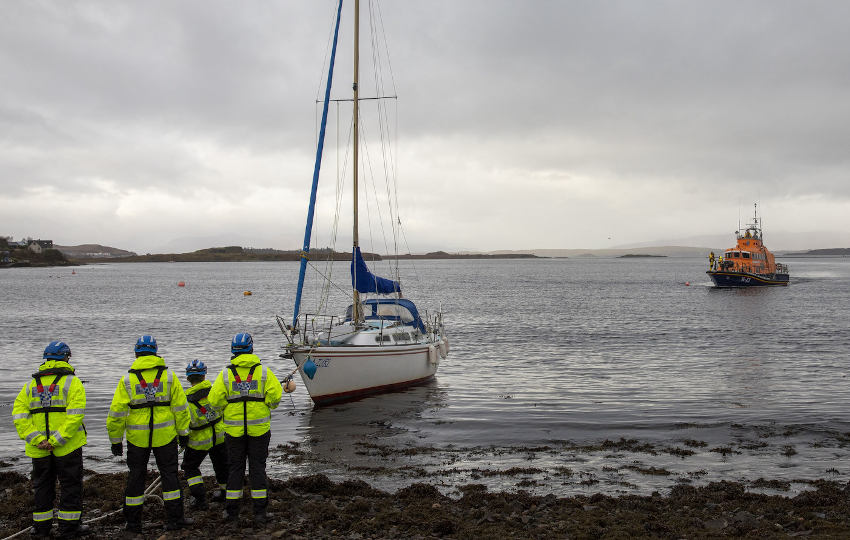
Elsewhere, in Oban, the lifeboat Mora Edith MacDonald was launched twice to two separate incidents between Friday and Saturday (3 & 4 January).
The first call came at 7.26pm on Friday following reports of a red flare sighting in Loch Melfort. A thorough search was conducted by the lifeboat, Oban’s coastguard team and HM Coastguard’s rescue helicopter but with nothing found, the search was stood down.
Just hours later, shortly before 10am on Saturday morning, the volunteers were called again, this time to a yacht that had broken its morning in Connel Bay and run aground.
Given the nature of the tides in the area, near the Falls of Lora, the decision was made to refloat the vessel, which has no persons on board at the time, and secure it to a nearby morning.
Cork Marine Auctioneer Appointed To Sell Supply Vessel In Aberdeen
#PublicAuction - Dominic J Daly’s success as a marine auctioneer in Cork has not gone unnoticed overseas — as the Sheriff of Aberdeen in Scotland has sought his services to auction a detained supply vessel.
The Indian-registered MV Malaviya Seven, formerly the Norther Clipper, is an 82.5m vessel built in Norway in 1994 to supply oil and gas platforms.
It was detained by the Maritime and Coastguard Agency in March for the third time in 12 months over non-payment of wages to its crew, according to Offshore Energy Today.
The vessel will be put up for Public Auction at 12 noon on Tuesday 17 October at the Rox Hotel in Aberdeen. The vessel is offered for sale as seen as is at Aberdeen Port.
Details of the MV Malaviya Seven include a very extensive bridge and other navigational equipment, two Ulstein Bergen BRM-8 engines with 9,600 BHP, and 1,208 registered tonnage.
Further details and conditions of sale are available from Dominic J Daly, Frics, Auctioneer, Pembroke House, Pembroke Street, Cork (Phone: (353) 21 4277399; Mobile: (353) 87 2550486; Email: [email protected]) or from the PDF available to download below.
Uk Coastguard Announces Public Meeetings to Discuss Modernising Service
The purpose of the meeting is to provide an opportunity for the local communities around the existing Maritime Rescue Coordination Centres (MRCCs) to hear more about the proposals, ask questions of MCA representatives and have the opportunity to express their views.
Each meeting will be independently chaired and will begin at 7:30pm, expecting to draw to a close by 9pm.
Humber - Monday, 21 February 2011, The Spa, South Marine Drive, Bridlington, East Yorkshire. YO15 3JH
Thames - Tuesday 22 February 2011, Columbine Centre, Princes Esplanade, Walton on the Naze, Essex. CO148PZ
Yarmouth - Wednesday 23 February 2011, Great Yarmouth Town Hall, Hall Plain, Great Yarmouth, Norfolk. NR30 2QF
Aberdeen - Wednesday, 23 February 2011, Pittodrie Stadium, Pittodrie Street, Aberdeen. AB24 5QH
Forth - Thursday, 24 February 2011, Waid Academy, St Andrews Road, Anstruther, Fife. KV10 3 HD
Dover – Thursday, 24 February 2011, Dover Town Hall, Biggin Street, Dover, Kent. CT16 1DL
Shetland - Monday, 28 February 2011, Town Hall, Upper Hillhead, Lerwick, Shetland. ZE1 0HB
Stornoway - Tuesday, 1 March 2011, Nicholson Institute, Springfield Road, Stornoway. HS1 2PZ
Solent - Tuesday 1 March 2011, Thorngate Halls (Community Centre), Thorngate Halls, Bury House, Bury Road, Gosport, Hampshire. PO12 3PX
Holyhead - Wednesday, 2 March 2011, Holyhead High School, Alderley Terrace, Holyhead, Gwynedd, Isle of Anglesey. LL65 1NP
Clyde - Wednesday 2 March 2011, Port Glasgow Town Hall, 35 King Street, Port Glasgow. PA14 5HD
Belfast - Thursday, 3 March 2010, Marine Court Hotel, 18-20 Quay Street, Bangor. BT20 5ED
Liverpool – Thursday, 3 March 2011, Southport Convention Centre, The Promenade, Southport. PR9 0DZ
Milford Haven – Friday, 4 March 2011, Cleddau Bridge Hotel, Essex Road, Pembroke Dock. SA72 6EG
Swansea – Monday, 7 March 2011, Marriott Hotel, Maritime Quarter, Swansea. SA1 3SS
Portland - Tuesday, 8 March 2011, All Saints Church of England School, Sunnyside Road, Wyke Regis, Weymouth. Dorset, DT49BJ
Falmouth – Wednesday 9 March 2011, Tremough Campus, Treliever Road, Penryn, Cornwall. TR10 9EZ
Brixham - Thursday, 10 March 2011, Brixham College, Higher Ranscombe Road, Brixham. TQ5 9HF
Kirkwall - Tuesday, 15 March 2011, Town Hall, Broad Street, Kirkwall. KW15 1DH
Ullapool – Wednesday, 16 March 2011, Macphail Centre, Mill Street, Ullapool, Ross-shire. IV26 2UN
The details of these proposals, together with the consultation documents, can be found on the MCA website at www.mcga.gov.uk.


























